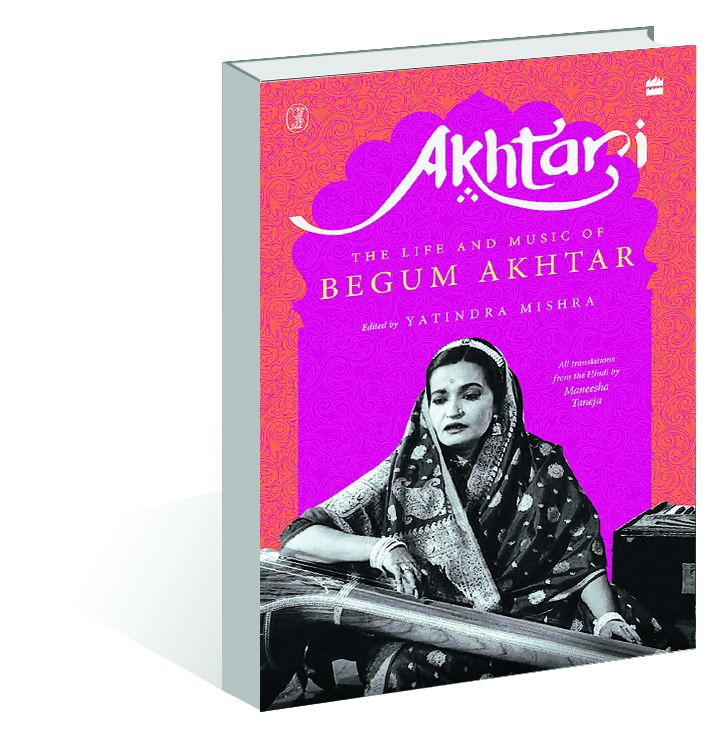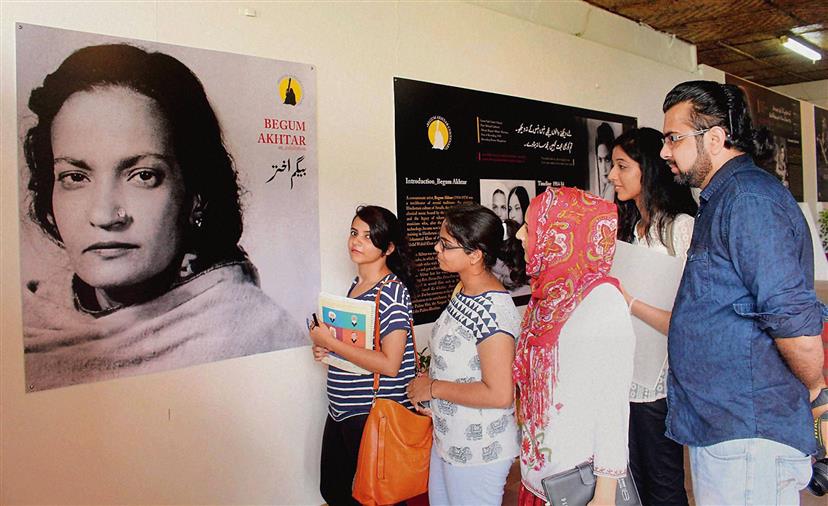
Akhtari, edited by Yatindra Mishra. translated from Hindi by Maneesha Taneja. HarperCollins. Pages 272. Rs699
Shailaja Khanna
One of the most iconic, trendsetting singers of our times, Begum Akhtar was in equal parts enigmatic and receptive to inputs about her craft. “Akhtari” comprises a series of essays by eminent writers and artistes, including Saleem Kidwai, Sheila Dhar, Yatindra Mishra (who has also edited the book), Shubha Mudgal, Sunita Budhiraja and Aneesh Pradhan, on the life and times of Begum Akhtar, initially famous as Akhtari Bai Faizabadi. As historian Kidwai puts it, “Begum Akhtar gave the ghazal an identity and respectability by adding the dimension of singing to it.”
Born in 1914, she recorded her first 78 rpm disc when she was only 13; by the mid-1930s, she was a rising star in the music circuit, performed in plays in Calcutta, and after that acted in films. However, she realised films were not really her métier, and singing was also more lucrative. So, she shifted back to Lucknow, creating an elegant base for herself.
As Kidwai says “There came a time when every poet, expert or novice, yearned for Begum Akhtar to sing his creation. With complete command over her musical idiom, she inflected nuances into the love poems that might have surprised and delighted the poets themselves.”
It was also the city of Lucknow that allowed her to transform from “a seductive Bai into a respectable Begum”. Her marriage to Barrister Ishtiaq Ahmed Abbasi from the aristocratic family of Kakori gave her an entry into a world she had hitherto only entertained from the outside. But it was not easy — in the words of Abbasi, “For six months, Lucknow talked of nothing else.” Marriage brought its own problems; as she put it, “I was the daughter-in-law of that house, I would shrink every time I heard my records play anywhere. My voice was my biggest treasure and now that was scaring me.”
The essays paint a picture of a fascinating person. Incredibly generous, she used to invite patrons to her house; unusually, she even gave them presents rather than the other way round. Kidwai mentions that she gifted the Nawab of Rampur’s son an expensive car! Mishra writes how, when she was leaving Faizabad in the 1930s, she returned the 50 or so acres that the ruler had presented her. Another interesting anecdote is her presenting a life-sized mirror from her home to her fan, the ruler of Bauri, as he had admired it!
On her art, Dhar puts it: “Akhtari Bai sang the ghazal with such insight and sensitivity she created a new area where poetry and music were simultaneously enhanced. She flowered into almost a cult figure, an ideal figure invested with such charm and charisma, an entire generation of women passionately wished to emulate her.” The Princes of Bhopal, Hyderabad, Rampur, Kashmir and Ayodhya gave her the status of court singer, not a small achievement.
Great musicians like Pt Jasraj took to singing because of the magic of her voice; even Pt Hari Prasad Chaurasia apparently was besotted with her as a child! Lata Mangeshkar shared that in the mid-1940s, she requested that a ghazal of Begum Akhtar be played on AIR’s “Apki Farmaish”; “I am being honest when I say the thrill of listening to my name with Begum Akhtar’s ghazal has been unmatched.”
As Dhar points out, there were many other singers as gifted, as well trained, with larger repertoires, wider voice range, and were possibly more hard-working; but Begum Akhtar had a unique magic “that nothing can explain”. Tabla exponent Aneesh Pradhan quotes the singer herself trying to explain that special “taaseer” her voice had, as being due to “sur kee sacchaayee”, or perfect pitch. Vocalist Shruti Sadolikar quotes Begum Akhtar as saying “it is important to have that pain inside you. When that pain is a part of you, you can convey whatever you want, and it will be effective. It is with pain that music is enriched”.
She sought refinement in everything in life. Dhar remembers an incident when she was genuinely pained that an organiser thrust her fees into her hands, not even bothering to put the notes in an envelope.
Some of the essays are merely personal recollections, and there is also a lot of repetition of material which could have been avoided. Perhaps the most interesting parts of the book are the memories of her disciples Shanti Hiranand and Rita Ganguli, and her own interview with Acharya Brihaspati. The comprehensive discography will delight her diehard fans.

Join Whatsapp Channel of The Tribune for latest updates.



























